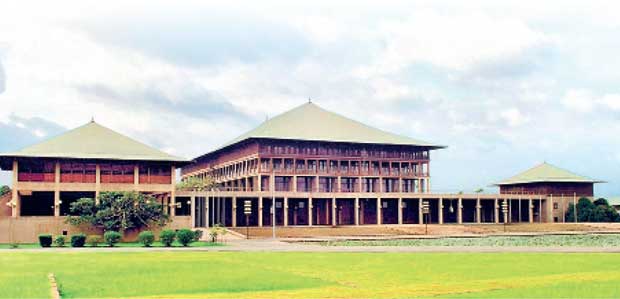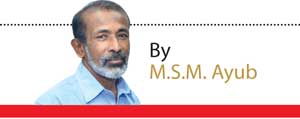Reply To:
Name - Reply Comment
Last Updated : 2024-04-20 00:00:00

 With the dawn of the New Year and President Maithripala Sirisena’s third year in office, the government seems to instill more hopes into the people by launching its development plans, despite it sustaining a heavy blow with the defeat of the Development (Special Provisions) Bill in eight out of nine provincial councils at the end of the just concluded 2016.
With the dawn of the New Year and President Maithripala Sirisena’s third year in office, the government seems to instill more hopes into the people by launching its development plans, despite it sustaining a heavy blow with the defeat of the Development (Special Provisions) Bill in eight out of nine provincial councils at the end of the just concluded 2016.
Apart from the ambitious development plans that are being placed before the country, the government hopes to introduce a new Constitution during the year through a Constitutional Assembly process mainly in order to democratize society, rid the polity of corruption and bring in reconciliation in the country that had been ravaged by a thirty year ethnic war. However, the government has to continue this process with a damaged credibility in the light of many incidents that occurred during the first two years of the President’s rule.
Interestingly, Sri Lanka has brought in either total or partial Constitutional changes whenever it was able to muster the two thirds Parliamentary power. However, the last three Constitutional amendments, namely the 17th, 18th and the 19th amendments, in a way, were forced down into some of those voted for them in the Parliament. Hence, some politicians who supported the institution of independent commissions through the 17th Amendment to the Constitution ludicrously voted for the 18th Amendment to abolish those very commissions and the 19th Amendment that reinstituted them.
With Britain granting Independence to Sri Lanka along with many of its past colonies, the country had seen three new Constitutions – in 1947, 1972 and 1978- for the past 68 years, whereas America and India saw only one each for the past 219 years and 65 years respectively.The short lives of the Sri Lankan Constitutions could be attributed to the efforts by the Sri Lankan Constitution makers to address the immediate needs of the incumbent rulers rather than to plan the future governance considering the evolution of the local and international political, economic and cultural situations.
The 16 amendments to the second republican Constitution of 1978 by the J.R. Jayawardene government in just ten years until that government lost its two thirds majority power clearly points to the shortsighted handling of the basic law of the country by its rulers.
The 1947 Constitution that was drafted by the colonial rulers in line with their outlook and future plans had been a major grievance cited by the Janatha Vimukthi Peramuna (JVP) during its insurrection in1971. That in turn was a main factor that prompted the United Front government of former Prime Minister Sirimavo Bandaranaike to introduce a new Constitution in 1972, severing all political and judicial ties with Britain and not attempting to address any other issue in that Constitution.
Although the closed economic policies of the United Front almost ruined the country’s economy, there had been a very strong ideology against the open economy proposed by the United National Party (UNP) in 1977, while the trade union movement affiliated to the old left parties that championed the closed economy rules the roost among the working masses then. Hence, Prime Minister J.R. Jayawardene who came to power in 1977 with five sixths of Parliamentary power wanted to bring in a powerful and somewhat dictatorial executive president and the proportional representation (PR) system in elections with a view to introduce his open economic policies through a stable government. Accordingly, he adopted the 1978 Constitution. Therefore, it is clear that all three new Constitutions implemented after Independence had been meant for the addressing of immediate requirements or ambitions of the incumbent rulers.
The current discourse on the new Constitution is also no different. It all started after the announcement of the last Presidential election by former President Mahinda Rajapaksa in October 2014. It was purely an upshot of power politics and not a genuine craving for “good governance” as professed by those who stood against the Rajapaksa regime.
The high-handed administration by Rajapaksa created a muster shed for all anti-Rajapaksa groups and those who had been harassed by his executive powers who simply agreed to abolish the executive presidency under a future government.The announcement of Maithripala Sirisena as the common Presidential candidate of the Opposition political parties for the 2015 January Presidential election on November 21, 2014 came along with that promise. They were also given another popular slogan on corruption by the frauds and corruption rampant during that regime.
There had already been an opposition against the current PR electoral system and a consensus on a mixed system had been arrived at through a ten year Parliamentary select committee process. In the meantime, Rajapaksa had chased away all minority ethnic and religious groups from his camp with his inaction against the communal rabble rousers which amounted to a covert support of them. In fact, things happened in a manner that minority communities suspected Rajapaksa or his siblings were behind the attacks against the minorities and were compelled to repose hopes on those who challenged him at the Presidential election.
Therefore, all these anti-Rajapaksa sentiments were used as the basis for the promise given by the current rulers during the last presidential and general elections on a new Constitution. However, what the people experienced during the past two years gives rise to many doubts on the genuineness of the rulers with regard to this very promise. For instance, in spite of Maithripala Sirisena, the common candidate predicting during his first press briefing on November 21, 2014 that a referendum on the abolition of the executive presidency would have to be conducted, the 19th Amendment to the Constitution was adopted by his government in April, 2015 with the partial pruning of executive powers of the President, on the grounds that a referendum was needed for the total abolition of the system. Besides, while questions are being raised on the legal immunity conferred on the President,the government recently presented the Development (Special Provisions) Bill with provisions for immunity conferred on certain authorities.
As far as the much hyped anti-corruption drive of the new government is concerned, the Committee on Public Enterprises (COPE) Chairman and JVP Parliamentarian Sunil Handunnetti recently said that the the government had been captured by the very thieves whom they had promised to capture. In fact, the President himself recently pointed out that the major corruption cases were being swept under the carpet, while the government has been accused of one of the largest ever frauds in the country- the Central Bank bond issue.
On the ethnic front, even the Cabinet spokesman, Minister Rajitha Senarathna said this week that he had a problem accepting the verdict in the Raviraj murder case. Citing the outcome of this case and the case on the Kumarapuram massacre, TNA spokesman and Paliamentarian M.A. Sumanthiran said these verdicts vindicated the demand for foreign judges in the proposed accountability mechanism. On the other hand, the President and some other leaders of the government, after cosponsoring a UNHRC resolution which provided for the involvement of foreign judges in the process, had backtracked on the matter later. And the government has failed to break the stalemate that prevails for more than thirty years in the discourse on issues such as an unitary state, federalism, devolution of power, north-east merger etc. Not a single person- Tamil or Sinhalese- seems to have changed his stand which was taken purely on ethnic lines on these issues during these three decades. Besides, some leaders of the government seem to have accepted the right of some sections of society to be above the law.
Hence, it is the onus on the part of the government to alleviate the doubts on the genuineness of the government in general and some leaders in particular, before continuing the Constitutional reforms, especially if it intends to go for a referendum on the matter.

Add comment
Comments will be edited (grammar, spelling and slang) and authorized at the discretion of Daily Mirror online. The website also has the right not to publish selected comments.
Reply To:
Name - Reply Comment
On March 26, a couple arriving from Thailand was arrested with 88 live animal
According to villagers from Naula-Moragolla out of 105 families 80 can afford
Is the situation in Sri Lanka so grim that locals harbour hope that they coul
A recent post on social media revealed that three purple-faced langurs near t